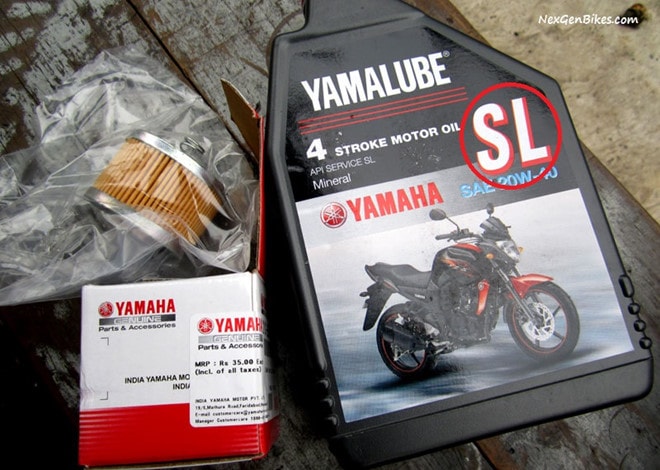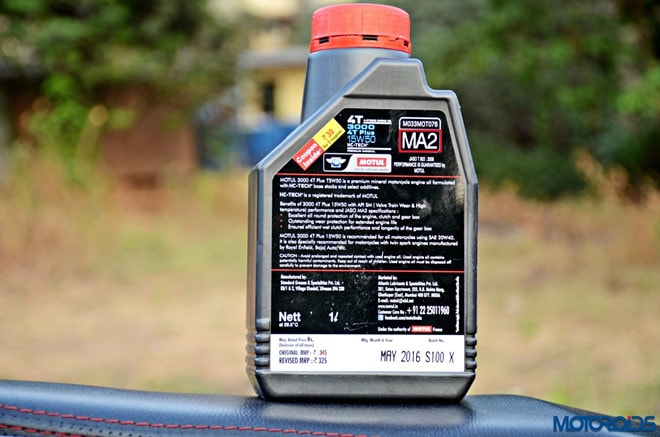Note with motorcycle engine oil
Choosing the right oil for your engine, your actual conditions and changing it regularly will help your car achieve maximum performance. This requires a certain understanding from each car owner.
Engine oil needs to be checked and replaced periodically. When going to the store to choose to buy engine oil, users have to face a series of questions such as which type is suitable, what to pay attention to when using...
Mineral and fully synthetic oils
Vehicles operating under harsh conditions such as high speed, heavy load or frequent traffic jams (large displacement motorcycles, scooters) should use synthetic oil. While mineral oil is suitable for normal use. However, the price of synthetic oil is much higher than mineral oil.
|
| Mineral and synthetic oils. Photo:Motorcyclistonline. |
Reference prices of some types of oil in Vietnam:
| Total Hi-Perf 4T Special 20W40 Mineral Oil | 85,000 VND/liter |
| Castrol Power 1 Power Release 4T 15W40 Semi-Synthetic Oil | 112,000 VND/liter |
| Liqui Moly Motorbike Street Race 4T 10W50 Synthetic Oil | 283,000 VND/liter |
Engine oil viscosity
It is necessary to choose the appropriate viscosity for the vehicle's operating environment temperature. In Vietnam's climate with an ambient temperature not exceeding 50 degrees Celsius, you should choose a viscosity with an index after the letter "W" from 40 or higher such as 15W40, 15W50 or 20W50.
However, when choosing to buy, you should base it on the viscosity information in the vehicle's manual because this index has been calculated by the manufacturer to suit the vehicle's operating environment and engine technical characteristics.
Manufacturer recommended viscosity for some vehicle models:
| Honda Wave RSX | 20W50 |
| Suzuki Raider FI | 10W40 |
| Honda Air Blade 125 | 10W30 |
For example, if the manufacturer recommends using 10W30 viscosity but the vehicle is using 10W40 which has a thicker viscosity, it will cause difficulty starting and the engine will feel sluggish at low speeds. On the contrary, if you choose a thinner viscosity than recommended, it will cause poor lubrication and rapid wear of parts.
Motorcycle oil grade
Viscosity grades relate to the operating conditions and quality of the lubricating oil. For example, SF grade is used in conditions where the engine operates at high speed continuously and at high temperature. SG, SH, SJ and SL grades are used for all operating conditions. Lubricating oil quality increases gradually from F to L with SL being the best grade available.
Motorcycles should use grades from SG to SL because they have the best quality according to API (Japan) oil standards.
|
| Yamalube grade SL oil. Photo: NexGenBikes. |
Notes for each vehicle line
Scooters need to use products printed with the word scooter to ensure optimal performance. This type of oil should not be used with manual or manual transmission vehicles because it causes clutch slippage.
Oil for manual transmission motorbikes should use MA or MA2 products. In addition, some manufacturers also recommend not to use oils labeled “Energy Conserving” or “Resource Conserving” because it can cause clutch slippage, leading to poor acceleration.
|
| Motul 3000 4T Plus MA2 standard oil. Photo:Motoroids. |
Popular MA2 standard products today:
| Total Hi-Perf 4T Racing 10W50 | 245,000 VND/liter |
| Eni i-Ride Aprilia Racing 10W60 | 360,000 VND/liter |
| Motul 300v 4T 10W40 | 399,000 VND/liter |
Oil level and oil pressure light
Before operating, check the engine oil level. Run the engine for 1-2 minutes in place. Then turn off the engine and check the oil level with a dipstick or sight glass depending on the vehicle type. The oil level must be between the L and F marks.
New cars are often equipped with an oil pressure warning light. During use, if this light is on continuously, the car needs to be checked and repaired quickly. Ignoring this warning light can lead to serious damage to the engine such as piston seizure, cylinder wear and moving parts.
Tips for diagnosing engine condition through oil
If the old oil is darker and thicker than previous changes, accompanied by poor acceleration and high fuel consumption, the friction plates in the clutch may be worn.
Put a few drops of oil on a piece of white paper and observe it in the sunlight. If you see a glistening drop of oil accompanied by noises and vibrations in the engine, some parts may be severely worn and the vehicle should be checked immediately.




